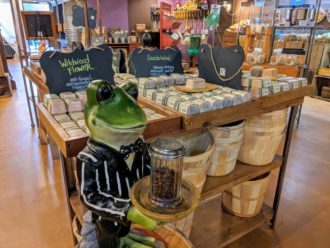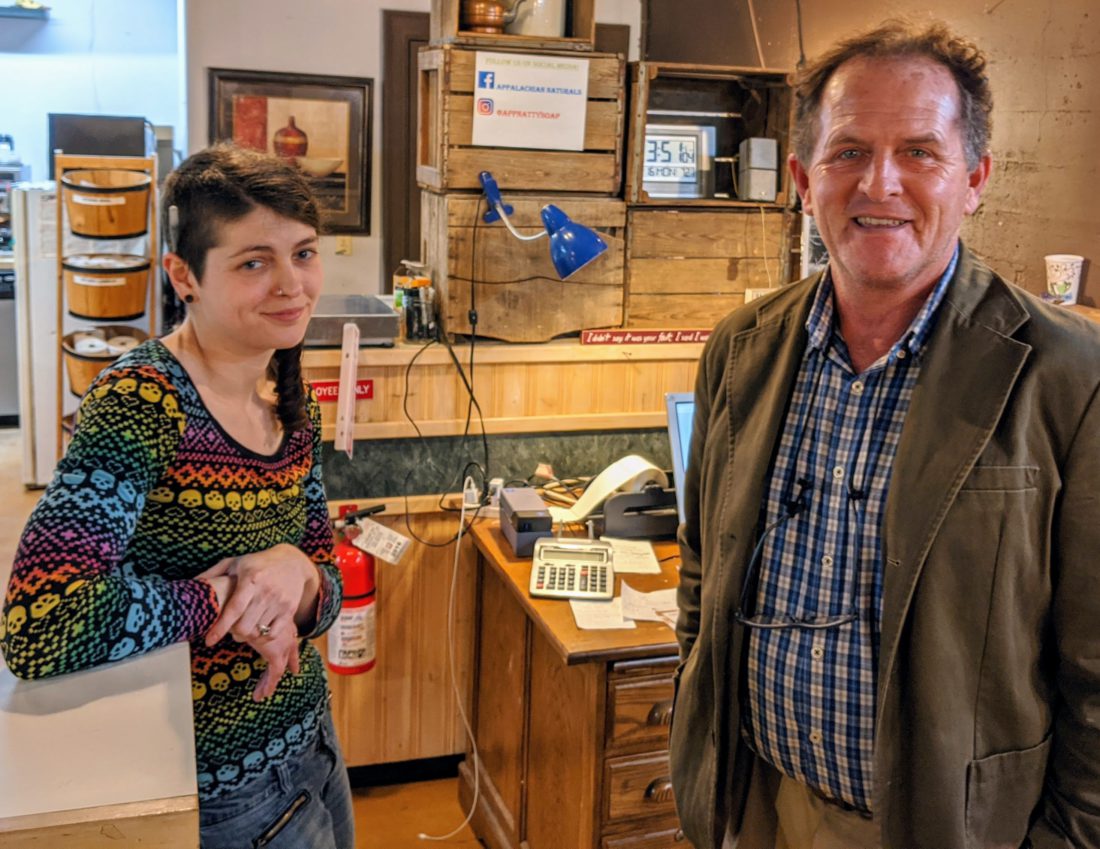Some of Victor Taylor’s earliest memories are of his grandmother making lye soap. Every fall while growing up, he would watch as she combined water, lye and pig fat in a cast-iron pot. “I always had to fetch wood for the fire on soap-making day,” Taylor says, remembering his upbringing on his family’s farm in Candler.
While Taylor’s soap making has outgrown its humble beginnings, the skills his grandmother instilled in him are alive and well. For 27 years, he has run Appalachian Naturals, an Asheville-based company that makes soaps according to his family tradition — and the needs of a new generation.
“We still do make those old-timey lye soaps,” Taylor says, holding a cream-colored bar of lye soap in one hand and a lavender-scented bar in the other as he stands in his company’s Wall Street storefront. “But many of our customers are vegetarian or vegan, and so now most of our soaps are made with coconut and sustainably harvested palm oil.”
For Taylor and other Asheville-area makers of self-care products, simple and responsibly sourced ingredients are key to their businesses. They work to meet customer demand for goods that promote not just healthier skin, but also a healthier planet.
Straight to the source
Sourcing sustainable ingredients can be a challenge, but it’s one that Heidi Vasone relishes. The owner of Bonny Bath, winner of the 2019 Best of WNC award for best local body product maker, says studying what goes into her oils and serums is part of the fun of her work. “Even before the internet, I loved going to the library and learning things,” she explains. “I am a researcher by nature.”
To Vasone, ethical sourcing means more than simply environmental sustainability, and she is unafraid to shift suppliers in response to what she learns. “For example, I’ve changed shea butters three times,” she says; her current source is a company in rural Ghana called FairTale Ghana. Local women produce the butter using traditional methods, earning fair wages for their work.
Christi Apodaca, owner of local skin care maker C&Co., also pays careful attention to where her ingredients come from and how they are grown. “When I founded this company 10 years ago, I intentionally sought out organic ingredients for formulating my product with,” she says. “Organic is so vital for not only making sure the plants are pesticide-free, but also for making sure nutrients are replaced in the soil, which not only helps the next generation of plants, but also the ecosystem.
“From day one, all of our ingredients have been responsibly sourced,” Apodaca continues. “This means they don’t come from regions that must be deforested to supply that ingredient.”
According to the World Wildlife Fund, deforestation is a leading cause of species loss worldwide, and agriculture is the primary driver of forest habitat destruction. The organization estimates that agricultural development eliminates 18.7 million acres of forest per year — an area larger than the entire country of Panama.
Deforestation is particularly worrisome for Taylor as well. Palm oil is one of the main ingredients in Appalachian Naturals soaps, and according to a 2013 European Union report, palm oil production accounts for 8% of all agricultural deforestation.
Countries such as Brazil and Indonesia, he points out, are slashing and burning old-growth tropical forest ecosystems to establish plantations of palm trees, which eliminates animal habitats and emits climate-changing greenhouse gases. “It is important for us to go to the extra expense to buy palm oil from environmentally responsible sources,” Taylor says.
But sustainable sourcing means buying exclusively from a limited subset of products on the market. Prices are generally higher, and ingredients can become unavailable if a supplier is put out of action. Apodaca shares how two years ago, C&Co. had to change its source for a particular bay leaf oil. Originally, the company had been using a source from the Dominican Republic, but due to hurricane devastation, sustainable Dominican sources of bay completely vanished.
Outside the box

Apodaca’s quest for products that preserve environmental welfare doesn’t stop with ingredients. “When it comes to packaging, we make sure to have sustainability in mind. We use a lot of glass, aluminum and a very small amount of plastic,” she says.
It can be difficult to move away from plastics entirely, Taylor admits. “There are certain things you have to do to bring a product to market,” he says. “We are required to shrink-wrap our soaps, but we are careful to use food-safe plastics.”
Nevertheless, Taylor is careful to keep packaging to a minimum. Aside from shrink-wrap, the remainder of a soap bar’s packaging consists of a small, recyclable paper label.
Minimizing plastic is an important step for reducing the carbon and pollution footprints of self-care products, but it is also crucial for maintaining product quality. Endocrine disruptors such as bisphenol A and phthalates are common in plastics and can interfere with hormones in the body. By mimicking the effects of estrogen, these chemicals can lead to developmental and reproductive health problems, according to the National Institute of Environmental Health Sciences.
To that end, C&Co. hopes to cut out plastic altogether in favor of more sustainable alternatives, such as compostable polymers derived from sugarcane. And as Apodaca notes, the most sustainable packaging is none at all.
“We don’t package unnecessarily,” Apodaca says. “We don’t package in boxes just for the glitz and the glam of it.”
For the packaging that must be used, the ability to reuse and recycle ranks as a major plus. “I put everything I make into reusable glass jars,” Vasone says about her Bonny Bath products. “Longtime customers will sometimes bring back old jars with labels from several years ago, which is always fun.” To encourage returning jars for reuse, she buys them back from customers for a dollar each.
Sustainable production isn’t the easiest way to make these self-care items, but for these businesses, it is the only way. “Everything we do has an effect on everyone else,” says Apodaca.




Before you comment
The comments section is here to provide a platform for civil dialogue on the issues we face together as a local community. Xpress is committed to offering this platform for all voices, but when the tone of the discussion gets nasty or strays off topic, we believe many people choose not to participate. Xpress editors are determined to moderate comments to ensure a constructive interchange is maintained. All comments judged not to be in keeping with the spirit of civil discourse will be removed and repeat violators will be banned. See here for our terms of service. Thank you for being part of this effort to promote respectful discussion.